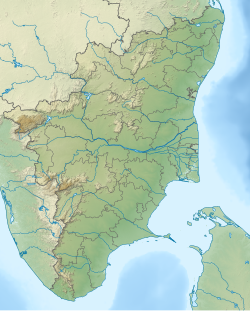| Thiruparankundram Dargah | |
|---|---|
 A view of the dargah | |
| Religion | |
| Affiliation | Sunni Islam |
| Sect | Sufism |
| Festivals | |
| Ecclesiastical or organizational status | Dargah and mosque |
| Status | Active |
| Location | |
| Location | Thiruparankundram, Madurai district, Tamil Nadu |
| Country | India |
Location of the mosque and dargah in Tamil Nadu | |
| Coordinates | 9°52′35″N78°04′09″E / 9.8764°N 78.0693°E |
| Architecture | |
| Type | Mosque architecture |
| Style | Indo-Islamic |
| Completed | 13th century CE |
| Specifications | |
| Dome | 1 |
| Minaret | 12 |
The Thiruparankundram Dargah, also known as Thirupparankundram malai Dargah, is a dargah (Sufi shrine) located in Thiruparankundram, Madurai district of the Indian state of Tamil Nadu. Located on the northeastern side of the Tirupparankundram hillock, the Dargah was built in the 13th century CE as a memorial for Saint Sikandar Badushah, who was warlord died on war. Ilayangudi landlord Miran Mugaidheen Rowther was rebuild the dargah in 1805. the death anniversary of Sikandar Badusha is commemorated as the Santhanakoodu festival on the 17th night of the Islamic month of Rajab every Hijri year. [1] [2]


